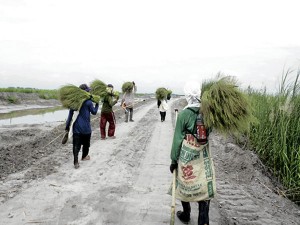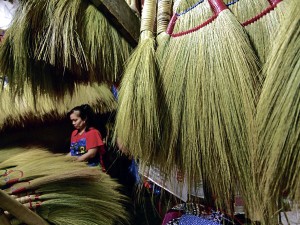Tiger grass growing on lahar fields sustain livelihood of broom makers

BUNDLES of tambo, or tiger grass, are harvested in Bacolor, Pampanga. TONETTE T. OREJAS/INQUIRER Central Luzon
BACOLOR, Pampanga—Lands left idle here by Mt. Pinatubo’s 1991 eruptions, later buried and nourished by layers of volcanic sediments washed down by rains, have turned into fertile fields of tambo (tiger grass), supporting broom makers in Nueva Ecija.
Harvest time in San Antonio and Aliaga towns in Nueva Ecija is January and February, but tambo thrives in the Pampanga towns of Bacolor, Minalin and Guagua way up to September, says Danny Pablo, 49.
SundayBiz chanced upon Pablo’s group at the downstream of the Gugu Creek on Wednesday. The creek has widened and meandered wildly since after the 1991 blasts, prompting farmers not to plant on these parts.
It is the abundance of tambo that makes Pablo and his five co-workers venture here for 45 days in the last four years to gather panicles, the soft fiber that shoots out like flowers from the grass.
He says around 100 Ecijanos do the same, camping out for days until they are able to haul enough supplies for the year-round, home-based enterprise.
Hailing from Barangay Papaya in San Antonio, Pablo’s group uses bamboo poles to bend the plant and enable the collector to snip the tambo by hand.
“Bigay ng kalikasan (A blessing from nature),” says Aldrin Mamangun, 25.
On his shoulder is a bundle of panicles. These are all he took from 7 to 10:30 a.m., caring to spare the shoots to enable the grass to yield more panicles in the next weeks.
The bundle, says Mamangun, is enough to make 15 walis tambo (soft brooms).
While the task is already difficult, having to work under the sun and entering thickets without safety clothing, it is dangerous too.

A BAGUIO market vendor sells walis tambo (soft broom) for P50 to P200. RICHARD BALONGLONG / INQUIRER NORTHERN LUZON
Last week, a tambo gatherer from Aliaga died from a snake bite, says Pablo.
When the tambo are sun-dried and woven in the village, that’s when Pablo begins to make the brooms, an enterprise he learned from his parents.
Sold at P30 to P50 apiece, the price does not actually reflect the tedious production process, he says.
Still, the business is able to support his children’s elementary and high school education. A steady supply, he says, ensures the regular stream of income. They farm rice and vegetables on the side.
“We have to go here to get tambo because there are not much in our province as lands are farmed for rice and other crops,” Pablo says.
Bacolor is about 40 km west of San Antonio.
Tambo, Pablo says, grows naturally in Bacolor but there is no homegrown broom-making business in the lahar-buried town.
San Antonio residents value the tambo, having dedicated a festival for this every feast day of St. Anthony the Abbot.
Walis tambo is San Antonio’s featured product in the government’s One Town One Product (Otop) program.














